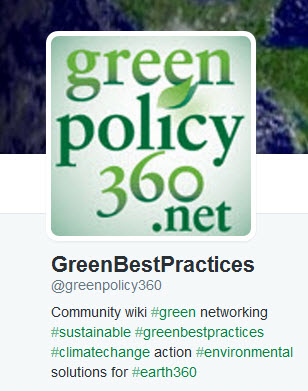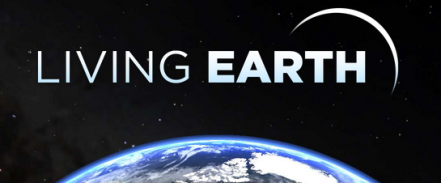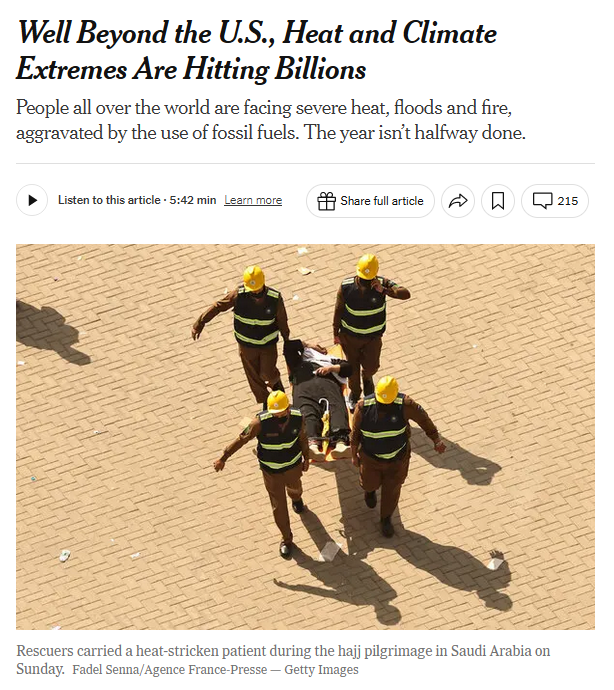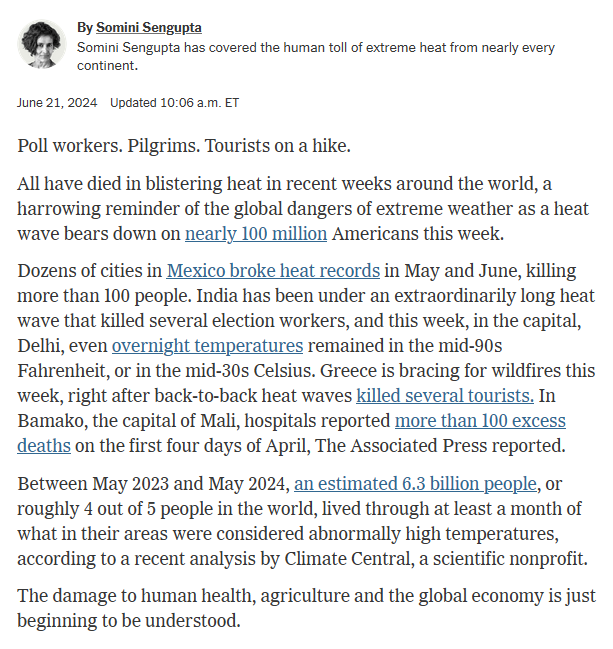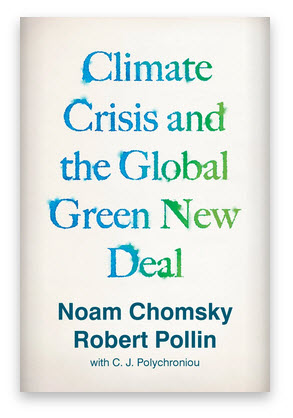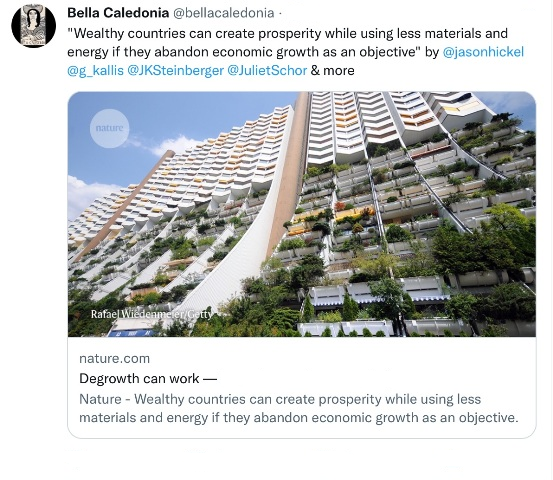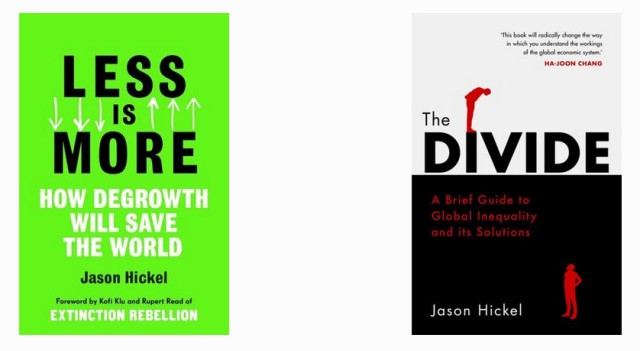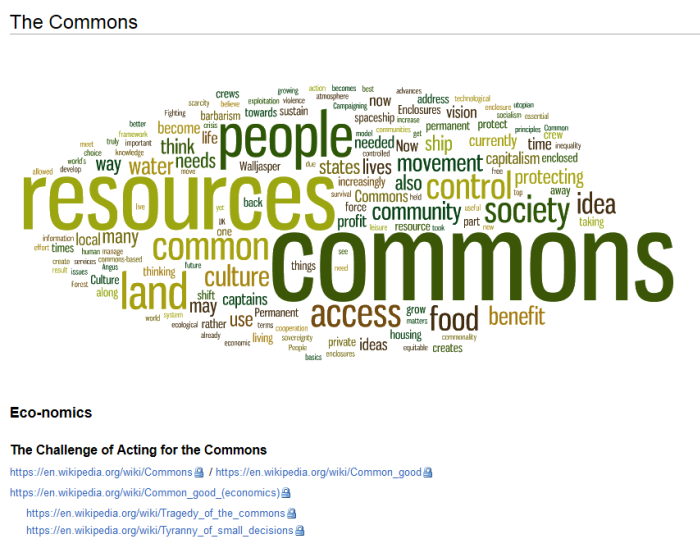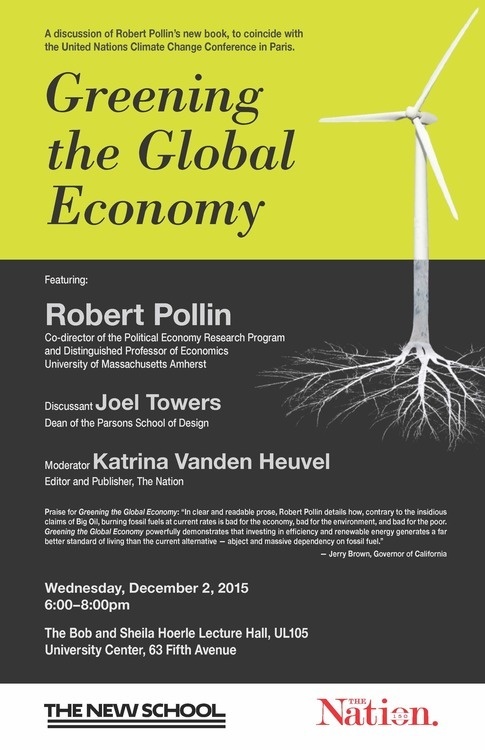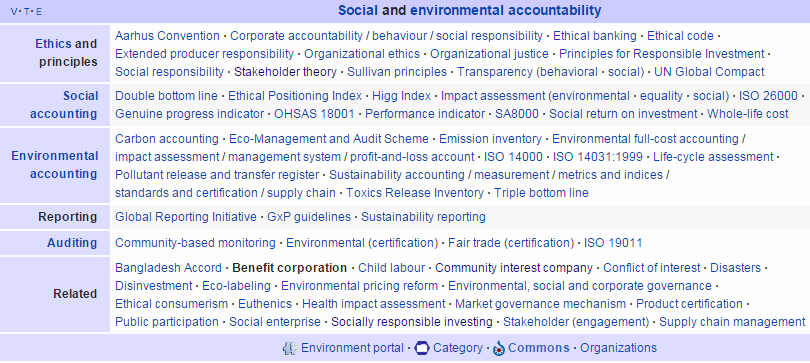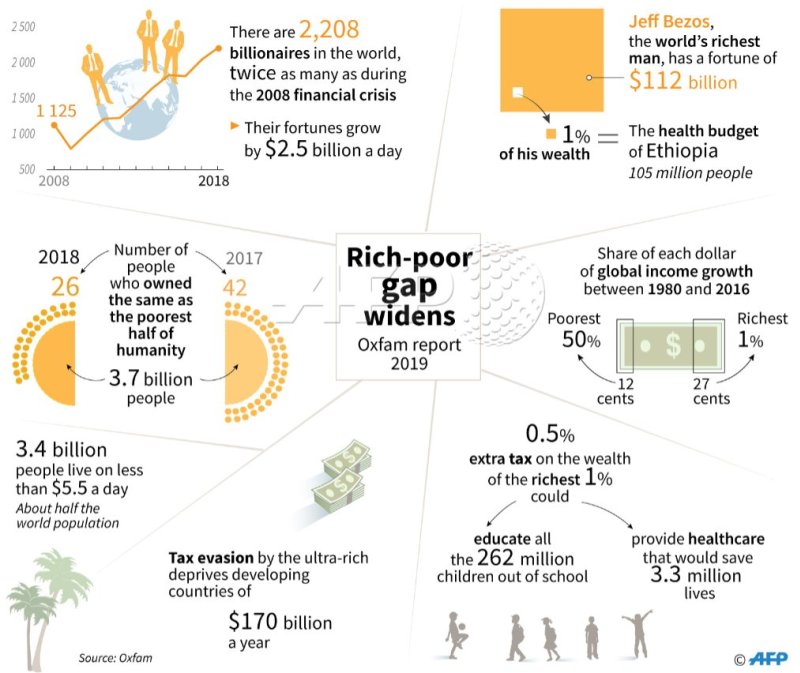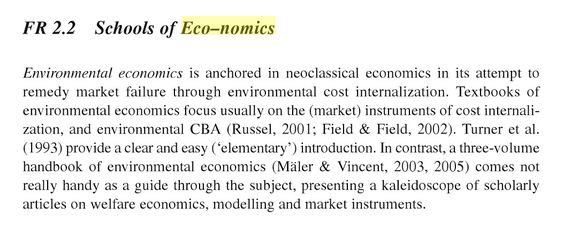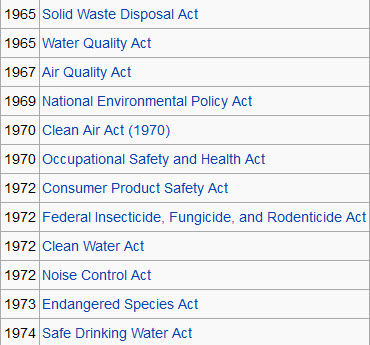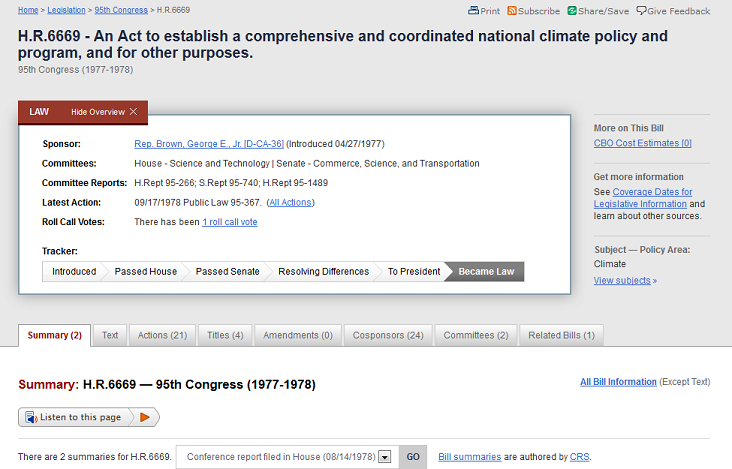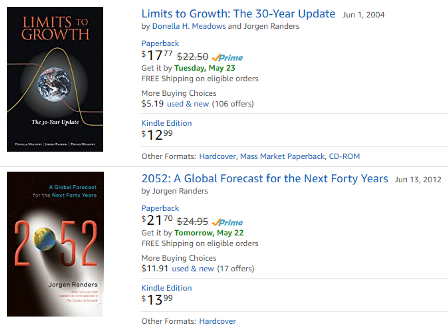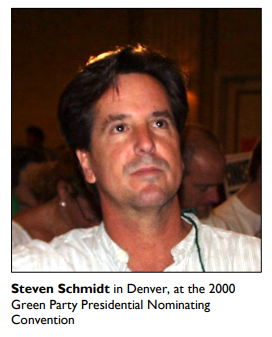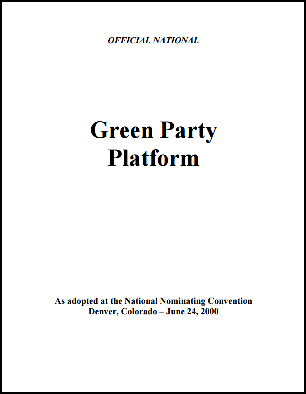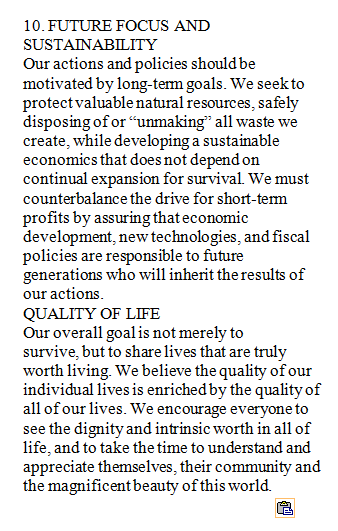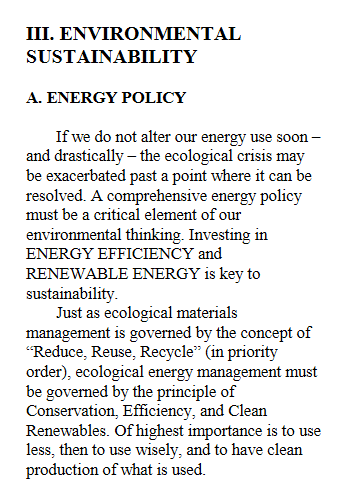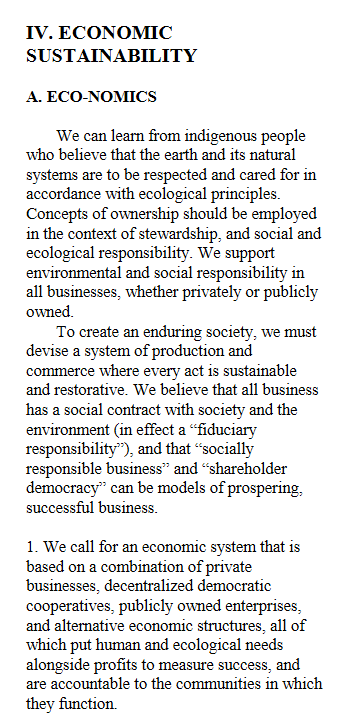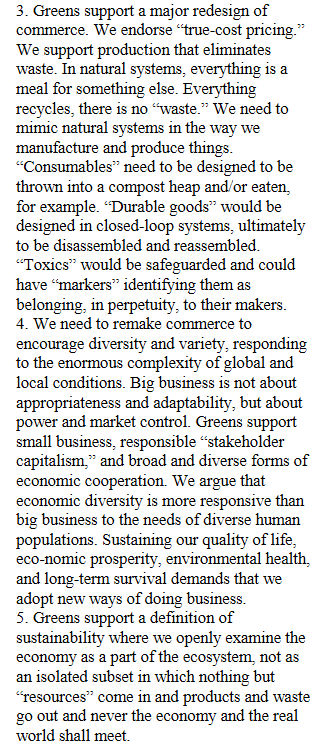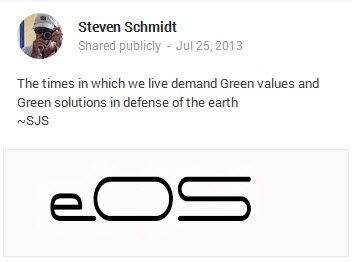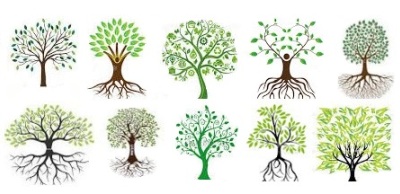Eco-nomics
Eco-nomics, Greening the Economy
- https://greenpolicy360.net/w/Eco-nomics
- https://greenpolicy360.net/w/New_Economy_Movement
- https://www.greenpolicy360.net/w/Environmental_full-cost_accounting
- https://www.greenpolicy360.net/w/GDP%2B
- https://greenpolicy360.net/w/Rights_and_Quality_of_Life
- https://www.greenpolicy360.net/w/Quality_of_Life
- https://greenpolicy360.net/w/The_Commons
- https://www.greenpolicy360.net/w/Thin_Blue_Layer
- https://greenpolicy360.net/w/Integral_Ecology
🌎
SJS - Steven J Schmidt / GreenPolicy360 Siterunner:
GreenPolicy360's vision supports a future of life on our Living Planet
Many of us experienced the beginnings of the Modern Environmental Movement
We have come to see connections, Earth Systems, a Whole Earth Perspective
As Planet Citizens & Planet Citizens, Planet Scientists, 'Eco-nomics becomes a guide'
View from the International Space Station
We look back and look forward here at GreenPolicy360
We see a Big Picture & we believe in Planet Citizen Action
Beginnings of the Modern Environmental Movement
A First Earth Day
- Youth-energy joined with 'Teach-ins' and events across the nation.
The Rise of Eco-nomics, Memories
GreenPolicy360/SJS: "Eco-nomics" as a concept can be said to have started in the mid-1970s under the tutelage of Professor Robert Heilbroner at the Graduate Faculty of the New School in New York City.
The good professor was offering up his thoughts to GreenPolicy360's siterunner who, as a student at that time, was questioning 'Hegelian' dialectic. The conversation turned to paradigms, systems of thought, thesis/anti-thesis/synthesis, and Thomas Kuhn was given as "additional reading". I remember the revelation of Kuhn's work to this day.
The 60s notion of how "it is all connected" began to find form as I 'shifted' my thinking from one paradigm to another yet to be articulated -- an eco-nomics.
As I listed to the professor in his lectures and read his papers and engaged in back and forth discussion, he believed in Socratic dialogue I learned throwing questions at me faster than I could wield answers, the game he was teaching began to become clear. He saw I was onto something, but I wasn't interested in an academic career. I realized then that I was a builder, like my builder-engineer father, a doer, and so it was. I finished my grad school coursework and moved on to a life of building. The construction of an "eco-nomics", a paradigm fit into a life and a career.
A green 'politics of values', 'a values-based politics' was the result, a foundation to build on, a platform to form what became a Green Party, then a green politics we are creating together here with GreenPolicy360 networking.
We see life on Earth under threat wherever we look in communities across the planet and as a Generation Green we are in the fields sowing seeds of change. We speak of our intergenerational responsibility to preserve and protect, to be 'out in front' in our politics of citizen action. We are focused on resilience, sustainability and, as founding principles, an ethics of key values.
At GreenPolicy we are going beyond classic economic theory and a standard metrics of GDP/GNP. Most all texts and terms that look backward are no guides to navigating a harsh eco-future that is presenting itself as a all-too-real strategic threats headed our way. We see the threat horizon, the intel is pulsing on the radar and humanity must acknowledge and see better directions to go forward.
Each generation faces great challenges of its times. Our 21st century challenge is to develop a multi-dimensioned economics, one that brings hope for a better tomorrow and does not exacerbate existential threats. We are facing poverty, massive inequality across the globe, environmental destruction and accelerating disrpuptive climate change. Some may deny the science, the data, that those of us who in the first wave of Earth science initiatives have produced but the physics, biology, the observations and dynamics tell a story of threat and loss. Let us not ignore or set aside the Big Picture or The Commons that GreenPolicy360 brings into the light..
Our generation has to find new ways to move forward, new visions, a 21st century vision and, toward this goal a new 'eco-nomics' is 'in-dev' at GreenPolicy360.
We are not a singular ideology hoisting banners of capitalism or socialism, libertarianism or capitalism. We are more pragmatic, a mix of the best strategies, policies, community and personal choices. We are a diverse mix of economic solutions. We are neither left nor right, we are 'out in front'.
We acknowledge real world problems and strive to solve them. We see what could be and what is needed, a new economy movement. We advocate for solutions and a 'new 21st Century vision' based on principles and democratic discussion, debate and decision-making.
We are vested in protecting inalienable rights and offer a rights agenda based on a core set of values ensuring civil and minority rights, human rights, natural rights, women's rights.
We present a choice of opportunities, an array of green best practices that work to make a difference, a positive difference.
Now is the time for delivering real financial security, a time for smart Eco-nomics, 'Quality of Life' and 'New definitions of national and global security'.
New Definitions of National Security
"Inside-Outside Strategies" ... Traditional, orthodox study of economics is changing and will continue to adapt to changing times. College and university departments will be studying and 'turning out' a new generation of academics and practitioners -- Eco-nomics is 'realo-politics in practice' and gathering speed.
The rise of schools of economic thought, such as Ecological Economics and Environmental Economics are clarion calls to challenge prevailing orthodox economic schools of thought.
In the 1970s, as the environmental movement, was putting down roots we look to an evolution in economic thoughts and economists outside the mainstream came into view again, names such as Thorstein Veblen and Joseph Schumpeter were featured at the Graduate Faculty of NY's New School.
Over the course of the 1980s and 1990s a move toward recognition of full-cost accounting/true pricing found fertile ground in your GreenPolicy360's writing. In the process of drafting the founding platform of the US Green Party I featured the central, pivotal importance of this concept governing feedback loops, current and future costs of production and externalities.
Eco-nomics is the name we chose to reflect the encompassing 'it's all connected'/'it's all related' economics field in which we began our research and field-work (and the field as grown over the past three decades, taking on names such as Ecological economics, bioeconomics, eco-economics).
🌎
"Eco-nomics" for the 21st Century
A New Green Political Economy
- Turning from Short-Term to Long-Term Thinking
- Eco-nomics, a 21st Century paradigm in development @ GreenPolicy360
Strategic alliances... smart policies... empowering ecology, economy & justice
- ············································································
- ·······························································
Eco-nomics, Local/National/Global
- Systems Thinking in a Connected World
- ·······························································
Green Stories & Climate News
2025
Climate & Agriculture, Temperature Rise & Food Production Disruption
- 2024 -- Global Heat Records Are Breaking, Food Supply Chains Are Hard Pressed
- Droughts, Water & Food Shortages, Traditional Production Methods in Danger
- Health Threatened in Poor Countries, Delivery and Prices in Developed Nations
🥵
Sustainability, Community-by-Community, a Food Revolution
- Smart, Sustainable Eco-nomics
- A 21st Century Vision of Agriculture, Healthy Food, Climate, Soil & Water
Antibiotics, Farming, Livestock Industry
Aquaculture, Aquafarming, Aquaforestry
Climate Smart Agriculture / Carbon Farming
Community Supported Agriculture
Farm-Related Policies/Category
Food-Related Policies/Category
Pesticides & Pest Management/Category
Seed Saving/Heirloom-Organic Seeds
'Slow Food' Alternative to 'Fast Food'
Soil Loss/Soil Depletion-Soil Conservation
○
Smart, Sustainable Investment Politics
- Beyond Non-sustainable Short-term Speculation, Exploitation & Resultant 'Life-Systems' Collapse
Money managers can weigh climate change and other factors when they make decisions for retirement investments on behalf of clients. It replaced a rule from the era of former President Trump that the Biden administration said discouraged consideration of ESG factors "even in cases where it is in the financial interest of plans to take such considerations into account.”
- Socially Responsible Investing (SRI), 'Values-Aligned Solutions'
Proxy Voting
Proxy voting electronically on behalf of shareowners in accordance with our comprehensive Proxy Voting Guidelines.
Corporate Engagement
Direct engagement with companies at the executive level to address ESG concerns. These can include equal opportunity employment, sustainable procurement and sourcing, climate impacts and other social justice issues.
Shareholder Resolutions
When informal engagement with a company is unsuccessful, formal shareholder resolutions are filed that companies must consider. Often filing a shareholder resolution by itself will cause a company to further engage. Other times, the resolution will escalate and must be voted on by all shareholders at the company’s annual shareowner’s meeting, drawing important publicity that can amplify impact.
Public Policy
Investor coalitions representing billions of investment dollars, working with policymakers and pushing other levers of power.
Partners in Advocacy
Formal and informal investor coalitions are organized to support and magnify impact, including (as case examples) Investor Alliance for Human Rights, The CDP (Carbon Disclosure Project), Chemical Footprint Project, and the Forum for Sustainable and Responsible Investment (USSIF).
○
On Wall St., ‘Socially Responsible’ Is Common Sense. In Congress, It’s Political.
- Lawmakers are trying to restrict these ESG investment choices in workplace retirement plans, but big fund managers are trying to give shareholders a voice
March 4, 2023
In the financial world, trillions of dollars have been placed in investments that take E.S.G. issues into account. “E.S.G. investing is now totally mainstream,” said Jon Hale, head of sustainable investing research for Morningstar. “It’s part of the thinking of every major investment company because, at its core, it’s just common sense.”
It’s not far-fetched to believe that under the Labor Department rules, and a few further changes, consistently applied, it may be possible one day for you to use your hard-earned retirement money to influence big companies to curb their carbon emissions.
“There are many approaches within E.S.G. investing,” said Tim Smith, a senior policy adviser and founding staff member at the Interfaith Center for Corporate Responsibility, who was present at the creation of the socially responsible investing movement. “It’s now a very big tent."
○
Big Money Fights over Investing, Assets, Pension Funds, Equity & Wealth Management
Wikipedia - In less than 20 years (from environmental, social, and corporate governance (ESG) decision making tracing to 2004), the ESG movement has grown from a corporate social responsibility initiative launched by the United Nations into a global phenomenon representing more than (~ US $40 trillion) in assets under management. In the year 2019 alone, capital totaling US $17.67 billion flowed into ESG-linked products, an almost 525 percent increase from 2015, according to Morningstar, Inc
* https://www.unepfi.org/fileadmin/events/2004/stocks/who_cares_wins_global_compact_2004.pdf
○
Fox News/Opinion / February 24, 2023
Retirement savings of millions of Americans could go to companies worried about climate change
GOP to Vote 'anti-woke'
○
The E.S.G. Fight Looms Ahead
GreenPolicy360's position -- 'Yes, properly, intelligently, appropriately, wisely, pick your word for smart investing. Our word is an acronym. ESG, and ESG investing's time is now'
○
Harvard Environmental & Energy Law Program
Environment, social, and governance (ESG) factors have boomed in recent years
Bloomberg has projected that ESG investments may surpass $41 trillion worldwide by the end of 2022, up from $22.8 trillion in 2016. In the US alone, sustainable investments grew to $17.1 trillion in 2020, which accounts for a third of US assets under management according to the US Forum for Sustainable and Responsible Investment.
As interest in ESG investing grows, there is considerable variation in how fund managers define ESG and how funds approach ESG investing. For example, some funds may exclude certain polluting investments like oil and gas, while other funds may include some oil and gas companies based on their stated commitment to decarbonization. There is also variation in the utility of the ESG label to investors: researchers have found high levels of misleading claims among ESG funds.
Regulators and investors are questioning the approach and impact of many ESG funds. Given the lack of relevant reporting requirements, it’s difficult for investors to understand how a fund accounts for ESG factors in investment decisions and what impacts those investments have on the issues they claim to address.
○
On May 25, 2022, in a long-awaited move, the U.S. Securities and Exchange Commission (“SEC”) issued a pair of rule proposals related to the use of environmental, social and governance (“ESG”) investment practices by open-end and closed-end registered investment companies, as well as by business development companies (“BDCs,” and collectively, “funds”). The SEC’s stated goals with these proposals are to increase transparency and confidence in funds that consider ESG factors as part of their investment process, given the recent and ongoing dramatic growth in investor interest in ESG investing. The SEC believes that investors looking to participate in ESG investing currently face a lack of consistent, comparable and reliable information among funds that claim to consider one or more ESG factors.
The first proposal seeks to create a robust disclosure and reporting framework for funds regarding their ESG investment practices. To effectuate this goal, the proposal would make a number of amendments to the registration and reporting forms utilized by funds in their securities offerings and ongoing periodic reporting. While the SEC does not generally prescribe specific disclosures for particular investment strategies, the SEC believes that ESG strategies and disclosures differ materially in certain respects that necessitate specific requirements and mandatory content standards to assist investors in making more informed investment decisions.
The second proposal would amend Rule 35d-1 (the so-called “Names Rule”) under the Investment Company Act of 1940, as amended (the “Investment Company Act”), to, among other things, add new requirements for funds that consider ESG factors in connection with their investment practices. The SEC believes that the Names Rule, which has not been amended since its adoption over 20 years ago, has not kept pace with industry developments and product evolution. Additionally, the SEC emphasized that competitive pressures may incentivize asset managers to include words in a fund’s name as a way to attract investor assets—for example, terms related to ESG. Further, the SEC expressed concern that the current Names Rule may permit funds to depart, over time, from the investment focus suggested by their name. Importantly, the proposed amendments to the Names Rule also would have significant implications for non-ESG funds, especially for those funds that may invest in more illiquid assets (including funds of private funds), and would mark a significant change, as the rule does not currently apply to commonly used fund names that focus on investment strategies instead of particular investments, such as “growth” or “income” funds.
Each proposal was approved by the SEC in a 3-1 vote along party lines, with Commissioner Peirce dissenting. The proposals will remain open for public comment for 60 days after their publication in the Federal Register.
○
ESG Factors
ESG Creates Value
Deloitte Insight into ESG
·····························································································
A Green New Deal (by another name) Steps Forward
March 2021
- From the President of the United States
- GreenPolicy360: Consider this a renamed "Green New Deal"
President Introduces First Part of His 'American Jobs Plan'
Joe Biden: "Put simply, these are investments we have to make," Biden said. "Put another way, we can't afford not to."
The plan would make a massive investment in America's roadways, railways and bridges with a focus on clean energy.
It would spend $174 billion, or about 28% of the transportation portion, on electric vehicles. That includes a nationwide network of 500,000 electric vehicle stations. It funds using electric vehicles in bus fleets, and replacing the federal government's fleet of diesel transit vehicles with electric vehicles. It also offers tax incentives and rebates for electric cars.
About $115 billion pays for fixing U.S. roads and bridges, selected by prioritizing those in most need of repair. This includes 20,000 miles of highways and roads, the 10 most "economically significant" bridges in the U.S. as well as 10,000 smaller bridges.
Another $85 billion is going for modernizing transit systems and $80 billion for a growing backlog of Amtrak repairs. Airports, ports and waterways also receive investments and improvements.
The largest part of the plan focuses on American homes, school buildings, underground water infrastructure and broadband expansion to connect rural America to high speed internet highways, enabling critical community development needs.
The 'American Jobs Plan' proposes spend $213 billion to build, preserve and retrofit more than 2 million affordable homes and commercial buildings. This includes the construction or rehabilitation of 500,000 homes for low- and middle-income owners. An additional $111 billion would go toward clean drinking water, including replacement of all lead pipes and service lines.
The plan sets aside $100 billion for constructing or modernizing public schools, while another $100 billion would be used to build high-speed broadband networks throughout the country. The goal would be for broadband to become universal for all Americans and to drive down the costs for internet.
The plan calls for $40 billion to improve public housing, $18 million for Veterans Affairs hospitals and clinics, $12 billion for community college infrastructure and $16 million to plug oil and gas wells and reclaim abandoned mines.
Biden proposes spending $400 billion to improve access to quality, affordable home or community-based care for the elderly and people with disabilities. It would expand a Medicaid program to make more services available and eliminate a backlog that prevents thousands from getting care.
About $300 billion in the plan would be invested in manufacturing, including support for domestic production of technologies and critical goods. Around $50 billion would go toward semiconductor manufacturing and research.
The plan would spend $180 billion on new research and development with an emphasis on clean energy, fewer emissions and climate change research. That total includes $100 billion for worker training and an increase of worker protection systems.
~
SJS/GreenPolicy360 Siterunner: On Monday (March 29), Sen. Edward J. Markey (D-Mass.) and Rep. Debbie Dingell (D-Mich.) unveiled a climate and infrastructure plan that called for $10 trillion in spending over the next decade.
Biden’s initial campaign pledge to invest $2 trillion over four years was already inadequate to confronting climate change, and his coming proposal may be even less so, said Robert Pollin, an economist at the University of Massachusetts at Amherst, who helped craft the Markey-Dingell plan
GreenPolicy360: Robert Pollin is a key figure, as we have reported in our mutual eco-nomics work. His role (as ours) in the 1992 Brown campaign and platform, and subsequent political campaigns building on this 1990's foundation, continue to point toward a Green New Deal vision of new economic policies. The union of political economists coming out of the New School in New York (where Pollin and your GreenPolicy siterunner studied in the 1970s as a new Eco-nomics came into view.
Speaking in advance of the formal launch of The American Jobs Plan, Robert Pollin said a $3 trillion investment amounted to only about 1.3 percent of the country’s gross domestic product.
Visit Green New Deal
New from Robert Pollin | via New School Graduate Faculty (see Siterunner's recollections above)
"Climate Crisis and the Global Green New Deal"
·····························································································
CONTENTS of ECO-NOMICS: A 21st Century New Economy
New Definitions of Security, New Visions of Growth, Resilience & Sustainability
I. Developing/Defining 'Eco-nomics' as a 'School of Thought', a New Paradigm
II. Creating/Introducing/Sharing Eco-nomics in the GreenPolicy360 GreenLinks Network
III. More than an Academic Concept, a Practical, Eco-nomics Operating System Application (an eOS-app)
SJS/GreenPolicy 360 Siterunner: The new book, "Climate Crisis and the Global Green New Deal", tracks with your GreenPolicy siterunner's work going back to 1992 and a presidential platform put together for the Jerry Brown presidential campaign. Robert Pollin is a considerable intellectual force in the shaping of a New Economy. It should be noted that many of the ideas and positions we put forward in the Brown campaign were picked up by Bernie Sanders in his campaign. I might also mention that your siterunner followed the Brown campaign by putting forward the "Blue-Green Alliance", an initiative I worked up and brought to US labor leader Tony Mazzochi. Also, during those years in the 1990s, your siterunner moved key positions from the Brown campaign into the drafting of the founding US Green Party Platform. The Platform was passed by a new US Green Party in 2000 and accepted by the Federal Election Commission in the new national US Green Party's application for legal standing.
At the center of this work is a 'paradigm', a Thomas Kuhn-like body of ideas that finds foundations from the New School in NYC where I studied alongside Robert Pollin and began together to create a new economics. For over 30 yrs I've written of a new "Eco-nomics" and it's good to see Noam Chomsky now coming along with Robert Pollin and advancing many proposals for a realistic Eco-economics, proposals going back decades as many of us push for change day in, day out. I appreciate, we appreciate at GreenPolicy360, Chomsky's focus now on working through the existing system, organizing and activating positive change given the pressing, immediate climate and political crises.
······································································
January 2021
A 'true-price' initiative rolls out in Amsterdam
Eco-nomics / Definining Eco-economics / A Key Takeaway
The notion of 'de-coupling' within the key ideas of eco-nomics begins our exploration of new economics
As Jason Hickel of the London School of Economics has written:
“Over and over again, empirical data shows that it is possible to achieve high levels of human welfare without high levels of GDP with significantly less pressure on the planet. How? By sharing income more fairly and investing in universal health care, education, and other public goods. The evidence is clear: When it comes to delivering long, healthy, flourishing lives for all, this is what counts — this is what progress looks like.”
Jason Hickel
What wrong with 'Degrowth'? Problems beginning with the name itself
GreenPolicy360: As Jason Hickel and others push a campaign for what is sometimes called "Degrowth", the notion of Degrowth brings political baggage. To de-grow is a non-concept. What doesn't grow? How and why should growing be stopped? Or, to be more cognizant of what is seemingly being said with this 'degrowth' phrase, shouldn't a more reality-based term be put forward with which to organize do-able economic development. Wouldn't a 'smart economics' be more appropriate, more realistic, more do-able?
Think about it, but GreenPolicy360 cannot sign on to a 'Degrowth' or 'De-growth' campaign.... we are visionary, we are about 'living earth' systems, growing is part of living... and smart development, intelligent decision-making policy is one of the core concepts of 'Eco-nomics', a school of thought that we have been debating for decades, beginning with the 'Limits to Growth' discussions and debates of the early 1970s. 'Overconsumption', 'Planetary Boundaries', 'Ecological Economics', a 'New Economy Movement' and multiple other ideas/concepts/schools of thought/taglines are now in play and in our opinion, 'Degrowth' is an outlier in this evolving attempt to chart a course that resonates and is realistic in finding viable support among political groups, cultures and nations.
An emerging economic model is looking to shift our focus from constant growth to balance, well being and quality of life
Could the Doughnut model become the compass we need for creating a safe and just 21st century?
·······················································································
More from the UK, Font of Classical Economics
George Monbiot Echoes Jason Hickel -- and Set Forward a Premise
"Perpetual growth on a finite planet leads inexorably to environmental calamity."
@GeorgeMonbiot, April 25, 2019 / For most of my adult life I’ve railed against “corporate capitalism”, “consumer capitalism” and “crony capitalism”. It took me a long time to see that the problem is not the adjective but the noun. While some people have rejected capitalism gladly and swiftly, I’ve done so slowly and reluctantly. Part of the reason was that I could see no clear alternative: unlike some anti-capitalists, I have never been an enthusiast for state communism. I was also inhibited by its religious status. To say “capitalism is failing” in the 21st century is like saying “God is dead” in the 19th: it is secular blasphemy. It requires a degree of self-confidence I did not possess.
But as I’ve grown older, I’ve come to recognise two things. First, that it is the system, rather than any variant of the system, that drives us inexorably towards disaster. Second, that you do not have to produce a definitive alternative to say that capitalism is failing. The statement stands in its own right. But it also demands another, and different, effort to develop a new system.
Perpetual growth on a finite planet leads inexorably to environmental calamity.
Capitalism’s failures arise from two of its defining elements. The first is perpetual growth. Economic growth is the aggregate effect of the quest to accumulate capital and extract profit. Capitalism collapses without growth, yet perpetual growth on a finite planet leads inexorably to environmental calamity.
Those who defend capitalism argue that, as consumption switches from goods to services, economic growth can be decoupled from the use of material resources. Last week a paper in the journal New Political Economy, by Jason Hickel and Giorgos Kallis, examined this premise. They found that while some relative decoupling took place in the 20th century (material resource consumption grew, but not as quickly as economic growth), in the 21st century there has been a recoupling: rising resource consumption has so far matched or exceeded the rate of economic growth. The absolute decoupling needed to avert environmental catastrophe (a reduction in material resource use) has never been achieved, and appears impossible while economic growth continues. Green growth is an illusion....
·····················································································
'Green Growth', Illusion or Potential for Eco-nomic Growth?
Taking Another Look at Herman Daly, Steady-state Economics and Sustainable Economies
History of science on the MediaWiki platform -- Shifts in a scientific paradigm presented by Professor Daly
·····················································································
Abstract: The notion of green growth has emerged as a dominant policy response to climate change and ecological breakdown. Green growth theory asserts that continued economic expansion is compatible with our planet’s ecology, as technological change and substitution will allow us to absolutely decouple GDP growth from resource use and carbon emissions. This claim is now assumed in national and international policy, including in the Sustainable Development Goals. But empirical evidence on resource use and carbon emissions does not support green growth theory. Examining relevant studies on historical trends and model-based projections, we find that: (1) there is no empirical evidence that absolute decoupling from resource use can be achieved on a global scale against a background of continued economic growth, and (2) absolute decoupling from carbon emissions is highly unlikely to be achieved at a rate rapid enough to prevent global warming over 1.5°C or 2°C, even under optimistic policy conditions. We conclude that green growth is likely to be a misguided objective, and that policymakers need to look toward alternative strategies. KEYWORDS: Sustainable development, ecological economics, green growth, degrowth, decoupling
················································································································
The world economy is set to double in size within the next 20 years. At the same time, we need to slash carbon emissions by 40 percent of current levels. That’s a daunting challenge, but in a recent talk at Columbia University, one of the world’s leading climate economists, Nicholas Stern from the London School of Economics, outlined how we could meet it.
················································································································
"Exergy", "Sink Costs", Capitalism: Ecological crisis, Economic transformation
Via the Independent, By Nafeez Ahmed, September 2018
“We live in an era of profound change.... The era of cheap energy is coming to an end.”
As the era of cheap energy comes to an end, capitalist thinking is struggling to solve the huge problems facing humanity.
Green economic ecology -- diverse approaches across communities, peoples, and nations
Challenges and opportunities that call for green policies globally and locally
Alternatives to Winner and Loser Economics
Democratic political economy — where people’s influence on policy is roughly equal and political preferences are arrived at through open, well-informed public debate — must be considered for any policy proposals in 2019. Too many policy ideas break on the rock of government capture by special interests or systematically distorted presentations in the media. Ethan Kaplan draws on a few decades of empirical political economy to suggest policies that could drastically alter the balance of political influence in the United States. His proposal exemplifies the strengths of empirical political economy as practiced in economics departments. The evidence cited is all carefully identified from naturally occurring variation and suggests a number of policies that could equalize political representation and increase turnout. Some of these suggestions highlight margins that are more likely to be thought of by an economist rather than a political scientist: for example, the increased influence of money when media coverage of politics is low suggests that politicians, behaving somewhat rationally, trade-off responsiveness across pecuniary and popular constituencies.
Many of the essays share the theme of how power asymmetries shape our contemporary economy. Many economists dismiss the role of power because they think it cannot be studied rigorously or belongs outside economics. As Naidu puts it in his essay, “under conditions of perfect competition and information, there is no scope for power.” But asymmetries between different groups abound: who has the upper hand in bargaining for wages and employment; who has market power and who gets to compete; who can move across borders and who is stuck at home; who can evade taxation and who cannot; who gets to set the agenda of trade agreements and who is excluded; who can vote and who is effectively disenfranchised. Some of these asymmetries are traditional political imbalances; others are power imbalances that naturally occur in the market due to informational asymmetries or barriers to entry.
Policies that counter such asymmetries make sense not only from a distributional standpoint but also for improving aggregate economic performance. The policy essays tackle these asymmetries frontally and suggest ways of rebalancing power for economic ends. Unions and wage boards can rein monopsony power in labor markets (Naidu and Dube); putting sand in the wheels of financial globalization can enhance the fiscal capacity of the state (Zucman); regulating private finance can prevent crises (Admati and Mian); giving labor a greater say in trade agreements can improve the design of trade agreements (Rodrik); and restricting campaign contributions and making it easier for poorer people to vote can increase the accountability of the political system (Kaplan).
- ·······················································································
A Green Paradigm --- Eco-nomics --- a New Vision of Economic Development & "The Commons"
- ·············································
- ·············································
SJS / GreenPolicy Siterunner: (Recalling the beginnings of the environmental movement and "eco-nomics" as a "school of thought")
In the mid-1970s, continuing what became a thirty plus year professional relationship with Congressman George E. Brown, I began to advocate developing a paradigm (ala Thomas Kuhn's definition of the scientific term) that extended environmental security concepts coming out of the student and environmental movement of the 1960s.
In the 1970s, as a young editor at a NY publishing and printing company, I took three years at nights to immerse myself in a History of Ideas / Political Economy program at the Graduate Faculty of the New School, the New School for Social Research.
Hannah Arendt was there when I arrived in the city and her reputation and the university's reputation as a "University in Exile" originally having attracted some of the top European liberal scholars in the world spoke to me of deep thinking.
Professors like Robert Heilbroner and David Gordon opened new vistas of thought as we introduced and debated capitalism versus new forms of economics that could begin to address conflicts and contradictions within capitalism. The legacy of world wars and the Vietnam war loomed in the rear-view mirror and the nuclear weapons brink of "mutually assured destruction" as the central strategic policy of the "Cold War" mentality loomed in pervasive form.
The political alternatives to conventional thinking found a voice in Democratic progressive politics. In 1976 I worked with California Governor Jerry Brown and his presidential campaign for the first time and during this period the Governor became nationally known for his forward thinking -- (some, like Mike Royko in Chicago thought the Governor was a little too forward and ribbed him with 'far out' names until years later when Mike apologized and most others publicly recognized the success of Governor's Brown's 'out in front' ideas...)
~
Over the 1970s and 80s Congressman George Brown and I continued to speak often and we regularly met in Washington DC. As a trained scientist/engineer, Congressman Brown continued as a strong voice in the science community and was focused intently on an array of environmental issues. He drafted the first national climate act that passed in 1978. The question of 'real security' not illusory security was at the core of both of our thinking and 'deep' environmental challenges were at the center of a new foundation of environmental legislation. During the period in the late 70s, the Congressman worked with vision to draft the first federal legislation studying the question of global warming, as the AAAS completed its first reports. We spoke together and in our circles of the challenges of industrial policy (as it was called) and costs, costs of war to protect oil/gas and costs to the public from pollution to air, water, cities, health. The Congressman and our allies were successfully shaping the first generation of environment laws and we were envisioning and achieving multiple goals in these endeavors.
In 1976, when I lived in NYC and worked with Jerry Brown in his first campaign for president, we began a long relationship. Our central message was one of ecological economics and in many regards we were ahead of the times, even as we were pioneering the modern environmental movement and California was bringing its legislation and regulations forward to the federal level (and Detroit) as models of what could be and should be accomplished.
Academically, a modern ecology/environmental movement was forming as a "school of thought" but this was more of a thread than a deep current capturing the a more diverse, multi-dimension body of knowledge, belief and vision.
In the early 1990s I worked more closely with Governor Brown, as a senior adviser in his presidential campaign, helping to set up the media/issues and correspondence functions (with quick 'turn-around) and drafting an 'insurgent' platform. We brought it forward advocating a change in direction for the Democratic party, a "peace dividend", a focus on worker/environmental standards, a move away from dominance of 'money-in-politics' to a new type of populist politics. Robert Pollin was our campaign's primary economic spokesperson and his green economic thought continues to be at the forefront of today's political vision. Although our '92 "We the People", "Take Back America" campaign surprised and succeeded in its own way, we lost to the Democratic Leadership Council and its chair, Bill Clinton. A move to compete in a war of money and campaign contributions took the Democratic party in a direction that I could not support -- and so I moved on...
My drafting of the founding national Green Platform began after the 1992 Brown campaign platform and your siterunner chose to 'go independent' and build a serious, credible Green Party, first in New Mexico and then a formal, legal Green national party.
The concept of 'eco-nomics' advanced in my work.
My writing and political ventures explored eco-strategic ideas, a new concept of political economy and sustainability as I discussed it with George, and Jerry, and associates in many arenas. At the time, as a member of the Writers Guild and immersed in movie-making, bringing serious themes to the big screen, I wanted to go beyond Hollywood and a writer with whom I was working, Stirling Silliphant, urged me to leave the city if I wanted to do "serious writing." So, after much thought, in the late 1980s I moved from the beach in Santa Monica and Pacific Palisades to the high desert, to Santa Fe, a town named after St. Francis of Assisi. I lived on Camino del Monte Sol, under Sun Mountain, across from a Monastery and the campus of St. John's College. I became an adviser to the President of St. John's College as we attempted to fund and build a new library and sought, at first successfully the archives of Robert Hutchins and the Center for the Study of Democratic Institutions as a core collection, then had to go back on our agreement when we were outvoted by the college's Annapolis directors.
My writing began every morning as monks chanted in the near distance and, in some ways, my original work reflected Bear & Company thoughts of that time as with Charlene Spretnak's "Spiritual Dimensions of Green Politics" and Matthew Fox were brought together with science that was revealing gathering threats to "the Commons".
The result was a more developed body of thought and work, "New Definitions of Security", and over the years these new definitions have expanded into security studies (as with Strategic Demands) and security briefs (as with Strategic Demands of the 21st Century: A New Vision for a New World, from conferences (Surviving Victory) to political platforms as foundations for presidential campaigning, Jerry Brown's in 1992, and on to the founding a new political party, the Greens in 2000.
Natures "strategy of survival", as we often say at GreenPolicy, lies in diversity.
The time for "Eco-nomics" is here and now. Let us explore new visions of security running deep with diversity.
Greening the Global Economy / 2015 / by Robert Pollin
More from Robert Pollin and a New School Political Economy Legacy:
“In clear and readable prose, Robert Pollin details how, contrary to the insidious claims of Big Oil, burning fossil fuels at current rates is bad for the economy, bad for the environment, and bad for the poor. Greening the Global Economy powerfully demonstrates that investing in efficiency and renewable energy generates a far better standard of living than the current alternative — abject and massive dependency on fossil fuel.” — Jerry Brown, Governor of California
In Greening the Global Economy, economist Robert Pollin shows that they are attainable through steady, large-scale investments—totaling about 1.5 percent of global GDP on an annual basis—in both energy efficiency and clean renewable energy sources. Not only that: Pollin argues that with the right investments, these efforts will expand employment and drive economic growth.
Drawing on years of research, Pollin explores all aspects of the problem: how much energy will be needed in a range of industrialized and developing economies; what efficiency targets should be; and what kinds of industrial policy will maximize investment and support private and public partnerships in green growth so that a clean energy transformation can unfold without broad subsidies.
All too frequently, inaction on climate change is blamed on its potential harm to the economy. Pollin shows greening the economy is not only possible but necessary: global economic growth depends on it.
- ○ ○ ○ ○ ○ ○ ○ ○ ○ ○ ○ ○ ○ ○ ○ ○ ○
- Eco-nomics: A Challenge to Classical and Neoliberal Economics
○
Economic Growth, Systemic Poverty
○
The Making of a Democratic Economy: Community Wealth-Building for a Sustainable Future
GreenPolicy360 / Networking Eco-nomics:
Via the Bioneers: When the U.S. Constitution was written, the Industrial Revolution, engineered by the new aristocracy of the railroad barons and kings of capital, had not yet emerged. The word “corporation” appears nowhere in the Constitution's founding documents. But by 1813 John Adams was writing to Thomas Jefferson, “Aristocracy, like Waterfowl, dives for ages and then rises with brighter plumage.”
We’ve seen that happen throughout American history, from the Gilded Age of the late 19th century to the “new Gilded Age” of the 21st. Today we live in a world in which 26 billionaires own as much wealth as half the planet’s population. The three wealthiest men in the U.S. — Bill Gates, Jeff Bezos, and Warren Buffet — own more wealth than the bottom half of America combined, a total of 160 million people. Meanwhile, an alarming 47 percent of Americans cannot put together even $400 in the face of an emergency, leaving most of us unprepared to face such ordinary mishaps as a flat tire or a child’s twisted ankle.
Our economy is not only failing the vast majority of our people; it is literally destroying our planet. It’s consuming natural resources at more than one-and-a-half times the Earth’s ability to regenerate them. We are razing the only home our civilization has, yet we remain caught inside a system designed to perpetuate that razing, in order to feed wealth to an elite.
The reason is that the system has a capital bias at its core, a favoritism toward finance and wealth-holders that is woven invisibly throughout the system. We might call it an “extractive economy,” for it’s designed to enable a financial elite to extract maximum gain for themselves, everywhere on the globe, heedless of damage created for workers, communities, and the environment...
With an eye toward building a more democratic economy
New approaches — such as chartering corporations to make them accountable to the public and giving equity shares to worker ownership funds, placing public ownership of utilities at the center of a Green New Deal, and creating public banks to finance democratic development models — point to a new system now being created. They herald a potentially profound shift from an extractive economy to a democratic economy.
The problem is that people by and large don’t see this — not even the people who are part of it. The work of employee-owned companies, impact investing, public banking, racial justice in economic development, local purchasing by anchor institutions, and more is being done in siloed activities all over the world.
It’s not that the new system hasn’t been named. It has too many names: “stakeholder capitalism,” the “solidarity economy,” “new economy,” “sharing economy,” “regenerative economy,” the “living economy.”
The struggle for new language is a sign of the times. We stand at a turning point where many share a sense of peril about the possibility of systemic collapse. As the old system fails, we’re losing the conceptual world that has given our lives meaning. We need new vision and new naming.
Socialism isn’t it. Capitalism isn’t it. An economy adequate to today’s challenges just isn’t there in those 19th-century paradigms. The “democratic economy” isn’t yet a term in common use. It’s offered here as a unifying frame for the movement that doesn’t know it’s a movement, aiming to help more of us recognize the potential for system-level transformation.
A democratic economy isn’t a top-down command economy. It isn’t capitalism plus more regulations and social safety nets, nor is it capitalism plus green technologies. Building a democratic economy is about redesigning basic institutions and activities—companies, investments, economic development, employment, purchasing, banking, resource use—so that the core functioning of the economy is designed to serve the common good.
Democracy needs to move inside the economy. Putting such values as sustainability or fairness on the outside of the system through regulation and social safety nets is like attaching barnacles to the side of a whale. These values need to be in the DNA. Anything less than deep redesign will likely fail to see us through the tumultuous era ahead for the earth community.
For More visit GreenPolicy360's friends -- the Bioneers
See Ted Howard speak about 'Making of a Democratic Economy' at the Bioneers Conference
• http://conference.bioneers.org
• https://conference.bioneers.org/speakers
···································································
Can capitalism, conservation, and cosmopolitanism coexist?
- Via Grist / by Nathanael Johnson / 2016
- https://grist.org/series/the-poverty-solution-put-people-first/
- https://grist.org/article/how-do-we-fight-poverty-without-wrecking-the-planet/
Unbridled capitalism cannot accurately value nature, and does not recognize the property rights of the people who depend upon the natural world for survival. All of humanity depends upon natural systems, of course — but it’s the poor living off the land who have the most to lose from their destruction.
When capitalism is bridled and harnessed, so as to recognize the rights of the disenfranchised, it can provide prosperity and protect the environment.
As economist Amartya Sen has argued, the goal of economic growth is not simply growth, but the provision of liberty. When people have freedom — freedom from hunger, disease, and oppression, the liberties necessary to take the long view — they can protect the resources they depend upon, not to mention the creatures and landscapes they love.
If people in poorer countries need to take a more expensive, but less carbon intensive, path out of poverty, rich countries should be prepared to pay the difference. At the Paris climate summit and preceding meetings, leaders have set up a (totally Byzantine) system for making these sorts of payments. So far, affluent countries have promised more than they have contributed.
The faster poverty declines, the faster the natural systems that support human lives will rebound — and, most importantly, the freer those lives will be.
○
Another point of view continues a critique of capitalism and sets aside the diversity of eco-nomic approaches, methods and solutions as not sufficient ...
The final paragraph of the author's analysis via a Truthout article addresses what he calls "Green Capitalism's failures..." and argues for a remaking of capitalism and instituting of 'command economy' decisions.
Richard Smith (An "Economic Historian", has "written on China, capitalism and the global environment and on related issues for New Left Review, Monthly Review, The Ecologist, the Journal of Ecological Economics, Real-World Economics Review, Adbusters magazine and other publications:
"We can't shop our way to sustainability because the problems we face cannot be solved by individual choices in the marketplace. In the final analysis, the only way to align production with society's interests and the needs of the environment is to do so directly. The huge global problems we face require the visible hand of direct economic planning to reorganize the world economy to meet the needs of humans and the environment, to enforce limits on consumption and pollution, to fairly ration and distribute the goods and services we produce for the benefit of each and every person on the planet and to conserve resources so that future generations of humans and other life forms also can live their lives to the full....
○ ○ ○ ○ ○ ○ ○ ○ ○
Eco-nomics: Are the Planet-Unfriendly Features of Capitalism Barriers to Sustainability?
Abstract This paper argues that there are essential features of capitalist modes of production, consumption, and waste dispersal in interaction with the environment and its built-in systemic features that contradict long-term sustainable development.
○ ○ ○ ○ ○ ○ ○ ○ ○
The Rise Of ECO-nomics: From Ego to ECO
- How to improve future competitiveness and the environment by changing the corporate consciousness
○ ○ ○ ○ ○ ○ ○ ○
○ ○ ○ ○ ○ ○ ○ ○
- Making room for a more complex view of what the obligations of managers might be
○ ○ ○ ○ ○ ○ ○ ○ ○
ECO:nomics: Capitalism and the Environment - A Wall Street Journal perspective - http://economics.wsj.com/
- "Fiduciary responsibility speaks of quarterly returns; survivability speaks to long-range vision and strategies"
March 2015 -- Wall Street Journal Forum -- ECO:nomics 2015 -- "New meaning of sustainability and the future of the environmental movement, where energy policy is heading"
Click here to view the 2015 WSJ ECO:nomics report.
Videos from ECO:nomics forum:
○ ○ ○ ○ ○ ○ ○ ○ ○
Overview: History of Ideas, "Schools of Eco-nomics"
____________________________________________
Ecological Economics
Sustainable economies, a new interdisciplinary framework that embraces the linkages among economic growth, environmental degradation, and social inequity.
"Blue-Green Eco-nomics: From the 1960s Forward
Global Security: Critical Security
○ ○ ○ ○ ○ ○ ○ ○ ○
Political Economy Research Institute
- University of Massachusetts, Amherst
The Political Economy Research Institute (PERI) "...promotes human and ecological well-being through our original research. Our approach is to translate what we learn into workable policy proposals that are capable of improving life on our planet today and in the future. In the words of the late Professor Robert Heilbroner, we at PERI “strive to make a workable science out of morality.”
○
The Limits to Growth / A slim paperback by a little-known publisher published in March of 1972 became the best-selling environmental title in history. More than three million copies have been sold in at least 30 languages.
Its message is 'commonsensical': If humans propagate, spread, build, consume, and pollute beyond the limits of our tiny spinning orb, we will have problems.
••••••••••••••••••••
As time goes by, the past gives way to new perspective and vision. A global green vision speaks to today and future generations. Green "eco-nomics" presents a guide to navigate toward resilience and sustainability.
The upside to growth is seen with perspective. The limits to growth are coming into focus as an environmentally aware movement with planetary comes into being.
○
Environmental full-cost accounting
New Definitions of National Security
○
SJS / Siterunner: Again, looking back to the Graduate Faculty of the New School in New York, it would be appropriate to look at the political economic writing of one of my professors, David M Gordon, who passed away at a young age in 1996. As David spoke of long-term economics and coined the phrase “social structure of accumulation” (SSA) that augers the need to consider multi-generation impacts of economic activity. Robert Heilbroner was a great inspiration to us all over the years. Let's look back and forward with David's co-author Thomas Weisskopf who writes of David at the 2014 David Gordon Memorial Lecture --- Reflections on 50 Years of Radical Political Economy
New School for Social Research / Political Economy-Liberal Studies-History of Ideas (1970-2000)
- Gordon, David M. with Bowles, Samuel, "Beyond the Waste Land: A Democratic Alternative to Economic Decline" (1983) - https://www.amazon.com/Beyond-Waste-Land-Democratic-Alternative/dp/0385183453/
- Gordon, David M. with Bowles, Samuel; Weisskopf, Thomas E. "After the Waste Land: Democratic Economics for the Year 2000 (1990) - https://www.amazon.com/After-Waste-Land-Democratic-Economics/dp/087332644X/
Publications of David Gordon Memorial Lecture Series - http://urpe.org/?page=rrpe&side=browse_content&sub=david_gordon_memorial_lecture
○
Modern Monetary Theory / Some thoughts by Stephanie Kelton
○
Center for American Progress
Economic Policy Institute
Institute for New Economic Thinking
Institute for Policy Studies
New America Foundation
○
Small Is Beautiful by E.F. Schmumacher (as interpreted by Governor Jerry Brown)
SJS / Siterunner: One of my first conversations with Jerry Brown, which began a decades long association, had to do with Schumacher and a philosophy, a paradigm, that was gaining support in our nascent environmental movement...)
- http://www.latimes.com/politics/la-pol-sac-climate-brown-profile-20151201-story.html / December 2015
Throughout his political career, Brown has displayed a desire to minimize society’s footprint on the Earth -- a stance that will gain a global platform when he arrives in Paris on Friday to participate in the U.N. summit on climate change.
In his spartan lifestyle as a young Jesuit seminarian, his famously barren apartment when he was governor the first time in the 1970s and his more recent campaign to slash greenhouse gas emissions, Brown has always explored ways to limit consumption.
Four decades ago, his focus on the environment -- talking of "Spaceship Earth" and exhortations that "small is beautiful" -- was a curiosity. But as 50,000 people gather in Paris in an ongoing effort to stop global warming, it’s clear that the world has caught up with Brown.
During his weeklong trip, the governor will tout California’s policies, rub shoulders with corporate executives, sign agreements with foreign leaders and be feted at the U.S. ambassador’s residence for his efforts to urge a stronger international accord at the summit.
“They’re not calling him Moonbeam anymore,” said Tom Hayden, an environmental activist and former state legislator who has worked with Brown for years. “This is his moment.”
Small Is Beautiful: A Study of Economics As If People Mattered
- By E.F. Schumacher, Book published in 1973
Wikipedia: Schumacher argues that the modern economy is unsustainable. Natural resources (like fossil fuels), are treated as expendable income, when in fact they should be treated as capital, since they are not renewable, and thus subject to eventual depletion. He further argues that nature's resistance to pollution is limited as well. He concludes that government effort must be concentrated on sustainable development, because relatively minor improvements, for example, technology transfer to Third World countries, will not solve the underlying problem of an unsustainable economy.
Schumacher's philosophy is one of "enoughness", appreciating both human needs and limitations, and appropriate use of technology. It grew out of his study of village-based economics, which he later termed Buddhist economics, which is the subject of the book's fourth chapter.
He faults conventional economic thinking for failing to consider the most appropriate scale for an activity, blasts notions that "growth is good", and that "bigger is better", and questions the appropriateness of using mass production in developing countries, promoting instead "production by the masses". Schumacher was one of the first economists to question the appropriateness of using gross national product to measure human well-being, emphasizing that "the aim ought to be to obtain the maximum amount of well being with the minimum amount of consumption". In the epilogue he emphasizes the need for the "philosophy of materialism" to take second place to ideals such as justice, harmony, beauty, and health.
Tags: #Sustainability #Eco-nomics #QualityofLife
○ ○ ○ ○ ○ ○ ○ ○ ○
GreenPolicy360 Siterunner:
A Blue-Green Alliance
In the mid 1980s, the name 'Tony Mazzocchi' first came on my political radar via Congressman George E. Brown in Washington DC. Tony went way back with my friend George. They had met in the 1960s and Tony's work on OSHA, the Occupational Safety and Health Administration laws in the 1970s became a centerpiece in environmental-labor progress. Both men, in their respective work, set in motion a series of regulations that became a foundation for worker safety and environmental health. The Congressman in his committee work aided the labor leader on a shared labor agenda for many years.
In 1992, when I worked on Jerry Brown's 1992 presidential platform, I first met Tony as the Governor Brown prepared for Democratic party debates with Governor Clinton. Governor Brown's position on the WTO (World Trade Organization), GATT (General Agreement on Tariffs and Trade) and NAFTA (North American Free Trade Agreement) stood in contrast to the direction being taken by the Democratic Party, especially in its DLC push for a 'new way', a neo-liberalism supported by business interests.
Tony Mazzocchi agreed with us that so-called 'free trade', guided in closed-door negotiations and dispute resolution by corporate business, was not the way to go. We pushed for guaranteed worker and environmental protections built in to the global trade agreements being negotiated. We argued strongly in the debates and I accompanied Governor Brown to the Democratic Party platform hearings where we continued to argue for comprehensive 'fair trade' pro-labor policy and a new 'New Deal' coalition.
We spoke of setting a 'floor in negotiations' to protect wages and worker-environmental standards. The hard-won gains won in the 1960s/70s/80s that made the US leader in the world in environmental and worker protections should not be undercut, we said, but become a set of standards other countries would need to move towards.
I spoke of a 'Blue-Green Alliance' with Tony and introduced a set of positions to bring environmental eco-nomics together with labor priorities. The policies we put forward, that Tony Mazzocchi supported, addressed 'non-tariff trade barrier definitions' and 'secretive tribunal decisions' used to punish the setting and protection of worker and environmental standards.
We spoke out for a 'transparent' flow of information to advance public discussion and decision-making. Big business interests argued for secrecy. They prevailed.
The Brown campaign came in second and was rebuffed in attempts to rework the platform. The Clinton campaign with its neo-liberal 'free trade' policies becames the face of the Democratic Party. The results are still playing out in today's economy.
Tony Mazzocchi and I continued to talk and in the 1990s I went on to draft a Green Party platform that carried forward a number of economic policies from the 1992 Brown campaign.
SJS: Initial True-cost pricing language in the founding U.S. Green Party platform
Eco-nomics became a central focus of my personal work drawing from work going back to the New School for Social Research in NY and fellow associates such as Robert Pollin, who now was also working on policy with Governor Brown.
Tony became special assistant to the president of the Oil, Chemical and Atomic Workers International Union (OCAW) and in 1996 when I was in the center of starting up a new US Green Party, he was in the center of starting up a new Labor Party.
I approached him in Washington DC before the WTO 1999 meeting and protests in Seattle and offered him a 'Blue-Green Alliance' opportunity with the new Green Party. He said yes, so we prepared our Blue-Green plan took the ideas to Seattle in 1999 for the WTO. Unfortunately, our message and alliance was setback by the street demonstrations that turned violent. Anarchists and extremists, provocateurs of different types, became the news and the WTO and globalization moved on without needed changes and reforms.
After Seattle, I invited Tony to speak at the 2000 Green Party Convention in Denver, in front of a couple thousand gathered supporters, where the new Green Platform was passed and Ralph Nader nominated.
Nader and Mazzocchi went way back to the 1960s. Another set of battles with Shell oil, and the first asbestos in the workplace laws and the OSHA worker protection movement, and Karen Silkwood vs. Kerr-McGee.
Read Tony's story. He passed away in 2002. His ideas carry on...
SJS / Siterunner: Robert Pollin was an economic spokesperson in our 1992 Jerry Brown campaign for President of the United States...
Pollin attended the New School graduate faculty in political economy in the period when we were both students and he brings exceptional green eco-thinking to the debate over future economics.
Robert Pollin continues to be associated with 'out in front' California politics and initiatives.
Single-Payer Health Care in California, the Numbers in 2017
File:Single-Payer-Pollin-Economic-Analysis-CA SB-562.pdf
Of course health care is a large percentage of the US economy and health care continues to be a vital issue and serious problem as the US faces facts that include tens of millions of its citizens going without care, and losses in quality of life and productivity that result. As Supreme Court Justice Louis Brandeis used to say about the federal political system of the US, the states can be "laboratories of democracy" at work. A single-payer health care initiative springing from California -- and following onto Governor Brown presidential campaign of '92 with its national health care policy position -- continues to present new opportunities.
Green Eco-nomics
SJS: Eco is a concept of connectivity. Eco-logical thinking has entered politics, where eco-awareness of connections help broaden narrow thinking. The green vision has found roots and is growing, spreading from local to global communities. The future is filled with the promise of green political thought.
Looking around we can see old and new, for example, it is sometimes said that "the future doesn't vote" and, as a result, future generations are neglected in having their voice heard. Yet, in eco-nomics the future comes int view. Greens think the future matters deeply. Green, eco-thinking carries ancient wisdom at times. Greens point to Indigenous peoples, like the Iroquois who had a democratic system of governance that looked to "the seventh generation" in their culture and decision-making. The future had a voice present in each generation. Often, green thinking speaks of 'what about tomorrow's children, tomorrow's environment, today *and* tomorrow's water and air, health and posperity, well-being and common interests?'
Green-leaning thought as a kind of "seventh generation thinking" extends beyond present demands and bringing forward key lessons and wisdom learned from the past.
Green ideas are now, more than ever needed given the multiple challenges modern economic systems.
Green ideas are being brought forward, locally/nationally and worldwide to face the challenges. GreenPolicy360's founder/siterunner found himself in the midst of Green Party politics in the 1990s. I'd be remiss if I didn't point out successes and disappointments in advancing ideas of "eco-nomics" though they were opposed by strident, ideological partisans. Let's look into the US Green Party as we built it and how a self-proclaimed 'vanguard' took the Green Party over...
Start with the drafting of the founding 2000 platform of the US Green Party.
US Green Party official founding platform (2000)
Steve Schmidt / GreenPolicy360 Siterunner: As a drafter of the founding Green Party platform (approved at the 2000 Green Party convention) and a chairperson of the platform committee from 1995-2001, I look back at the drafting of the US Green Party founding platform with appreciation for the work that went in to it, every word typed and posted to the new site I set up @ gp.org after going through a lengthy process of discussion, debate and decision-making.
It was, as a result years later, somewhat of a shock as I watched how a small cadre of individuals took over the Green Party and, in a quick succession during the Jill Stein campaign, wrote up and managed the passing of an amendment that completely changed the core beliefs and positions of the Green Party.
As of 2016, the current Green Party is no longer a continuation of the founding party, but rather has become an ideological re-version of the founding green political vision that led to the 2000 founding and national status of the political party. For those interested in the US Green Party, and how it was taken over and changed, here are a number of recollections and memories by one of the original organizers, your GreenPolicy360 siterunner.
Steven Schmidt/SJS / US Green Party Platform Chair 1995-2000
The Green platform captures a green "future-focus" and a "Call to Action" to move to a more sustainable eco-nomic system.
"Fiduciary responsibility goes to quarterly returns; survival and sustainability, 'survivability' speaks to long-range vision and strategies" -- SJS
Excerpt from the founding platform of the US Green Party
Eco-nomics from a Green Political Perspective
"Offical National Green Party Platform"
- Excerpts from the US Green Party founding platform, 2000
Then go to the take-over...
2023
Green Party Setbacks, a U.S. Update
An inside perspective: No one ever said being green was easy and in the United State political landscape, organizing a serious third-party is an exceptionally rough road to travel. In the US the current Green Party is unfortunately a victim of extreme forces who have taken over the Green Party. Although the need for effective, diverse and serious green politics is undeniable amid multiple challenges, ranging from the climate crisis, to threats on democracy, the US Green Party has floundered and collapsed.
Throughout the years of the Green Party organizing in the US, beginning in the 1980s, a strident contingent, factions described as 'authoritarian left', 'Bookchinites' (ala Murray Bookchin), 'syndicalists', 'anti-capitalists', and so on had attempted to takeover the Green Party name and platform. The extreme ideology of these groups in a larger Green Party failed again and again in their plans. For some twenty years they continued to block serious 'big tent' green organizing.
When a legal US Green Party was organized and a founding platform approved in 2000, those opposed to a broad-based party immediately approached the Green Party's candidate for president, Ralph Nader, who was persuaded by this faction to break his campaign promises to run on the Green Party platform. A 'contrarian' campaign resulted as Nader focused his redirected campaign not on outreach, fusion, and turning Green platform positions into reality. Instead the presidential campaign result was a profound setback to policies adopted and advocated in the founding Green Platform. The extremist faction, a small but aggressive group that professed to be 'green on the outside, and red on the inside', managed to turn the 2000 campaign into a debacle with election results and consequences that went into the history books.
The Green Party began a collapse after the 2000 campaign and the collapse has continued since.
Today, twenty plus years on the US Green Party is now 'mandated' by a small, self-declared "revolutionary, eco-anarchist" vanguard. The particulars of this group have become a footnote in U.S. politics, as this group attempts to be 'spoilers'. This faction, that can be described as having expropriated the US national Green Party name, has rewritten the founding Green Party platform by fiat, broken up of state Green parties and halved ballot access across the country, is unable to organize any in-person national convention that is seen as serious. This cadre wants smaller to be in control. Their virtual ZOOM meetings are a new norm.
A rational Green Party of multi-position, engaged green politics was a goal in building an independent, new Green Partybut over the years extreme voices have turned the broad-based green parties values and ideas into an ideological manifesto. The result is here to see -- grifting, expropriating the Green Party name.
Although the need for a rational green politics is needed in the US and communities across the world, a successful, effective US Green Party in the US is far from existing. A rational Green Party political voice is, in fact, not present in the US political arena.
There is little about the current Green Party (cGP) political presentation that borders on realo-politics. The cGP is, on examination, a shadow, a game being played by a cadre. Look closer, facts are important and the goals of this cadre should be, need to be, brought forward as they are in real politics.
For the record, Eco-nomics as a body of thought, ideas, and politics that was a core element in organizing the US Green Party is now history. The cGP has shrunk profoundly with its cadre in control, the state Green parties moribund, with a program far removed from the founding platform approved in 1996 and2000. The current Green Party in the US has hoisted a different banner and should, in fact, change its name.
The Eco-nomics brought forward here at GreenPolicy360, even as it helped to build the US Green Party in the 1990s, is now distinct, separate and far from any cGP relationship.
○
Green politics continues forward as a worldwide politics with Green political parties and formations in over 100 countries. These are a vital subset of a fast growing, 'out in front' politics.
Going Green
- Green Politics, Environmental Security
- Protecting Communities, Protecting the Future
Green Politics 360:
- "Value-based politics", a "politics of values"
GreenPolicy360 eco Operating System (eOS) / Local/National/Global
Green Networking * https://www.greenpolicy360.net/w/GreenLinks
GreenPolicy360 Siterunner
- GreenPolicy360 journeys across 50+ years of the modern environmental movement
The beginnings of green politics can be found in its focus as a peace movement and anti-nuclear weapons voice calling for moving beyond the Cold War and toward a "peace dividend."
The peace movement of the 1960s/70s grew into a deeper movement advocating new paths to security in the 1970s/80s.
🌎
- Eco-nomics
- Energy
- Green Politics
- Labor Issues
- Renewable Energy
- Transportation
- US
- City Governments
- City-County Governments
- Economic Development
- Green Best Practices
- Green Business
- Labor Unions
- Topic
- Workers Rights
- Anthropocene
- Atmospheric Science
- Bioneers
- Biosphere
- Citizen Science
- Civil Rights
- Clean Air
- Clean Water
- Climate Change
- Climate Policy
- Climate Migration
- Democracy
- Democratization of Space
- Digital Citizen
- Digital Rights
- Diversity
- Earth
- Ecological Economics
- EOS eco Operating System
- Earth360
- EarthPOV
- Earth Observations
- Earth Science
- Ecofeminism
- Ecology Studies
- Economic Justice
- Environmental Full-cost Accounting
- Environmental Laws
- Environmental Protection
- Environmental Security
- Environmental Security, National Security
- Global Security
- Global Warming
- Green Networking
- Human Rights
- Land Use
- Legislation
- Money in Politics
- Natural Resources
- Natural Rights
- Networking
- New Definitions of National Security
- New Space
- Nuclear Nonproliferation
- Online Education
- Overview Effect
- Peace
- Planet Citizen
- Planet Citizens
- PlanetLabs
- Planet Scientist
- Planet Citizens, Planet Scientists
- Resilience
- Sea-Level Rise & Mitigation
- Seventh Generation Sustainability
- Social Justice
- Solar Energy
- Strategic Demands
- Sustainability
- Sustainability Policies
- ThinBlueLayer
- Water Quality
- Whole Earth
- Wildlife
- Women's Issues
- Women's Rights
- World Wide Web
- Youth
